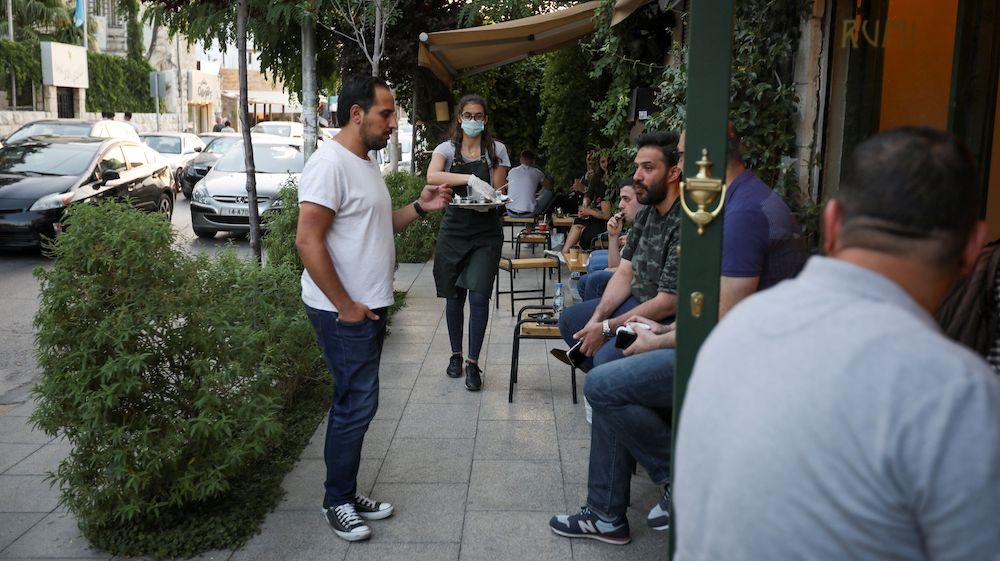Coronavirus cases pass 24 million globally: Live news
Spain reports over 3,500 infections; Myanmar imposes lockdown in Rakhine state; Davos meeting delayed to summer 2021.
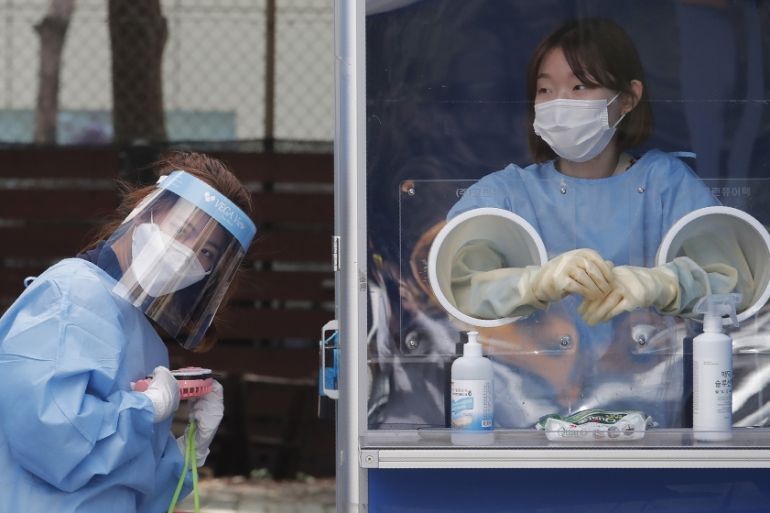
-
Myanmar has reported the highest single-day surge in coronavirus cases. The country has expanded a lockdown in conflict-racked Rakhine state which registered most of the infections.
-
Doctors in South Korea have been ordered to return to work because of the continued surge in coronavirus cases after they began a three-day strike on Wednesday over government plans to train more medical students.
-
The 2021 Davos World Economic Forum (WEF) summit of business leaders and politicians has been postponed from January to summer 2021.
-
More than 24.0 million people around the world have been diagnosed with the coronavirus, and 15.6 million have recovered. More than 821,000 have died, according to data from Johns Hopkins University.
Here are the latest updates:
Wednesday, August 26
20:59 GMT – India: Health workers alarmed over ‘black holes’ in COVID-19 apps
Harinder Kaur was not surprised when people slammed their doors in her face as she walked into neighbourhoods in the northern state of Punjab armed with a smartphone and a long list of health and travel-related questions.
Keep reading
list of 4 itemsMexico’s teachers seek relief from pandemic-era spike in school robberies
‘A bad chapter’: Tracing the origins of Ecuador’s rise in gang violence
Why is the US economy so resilient?
The 28-year-old health worker had been told to go door-to-door in villages in Patiala district and help populate the state’s COVID-19 tracing app with “thousands of details” people were unwilling to share, from their digestive health to their mobile numbers.
“People were just hostile,” said Kaur, who is one of more than one million Accredited Social Health Activists, or ASHA workers, on the front lines of India’s battle to contain the spread of the novel coronavirus.
Read more here.
|
|
20:32 GMT – Brazil asks China for proof chicken wings had coronavirus
Brazil has asked Chinese authorities to provide results of laboratory tests that detected traces of the novel coronavirus on chicken wings exported by the South American country, according to a statement sent to Reuters by Brazil’s Agriculture Ministry.
The request was made during a meeting in the city of Shenzhen, in Guangdong province, where Brazilian agriculture attachés met local health and trade officials on Tuesday, the statement said.
In response, according to the statement, the Chinese participants said the results are being kept by health authorities of Guangdong, who did not participate in the meeting.
19:53 GMT – US health agency says some exposed to virus do not need test, reversing course
The US Centers for Disease Control and Prevention narrowed its guidance for who should get tested for COVID-19 this week, saying those who were exposed but are not symptomatic may not need to be tested.
That is a reversal from its previous recommendation, which said testing is recommended for all close contact of people diagnosed with COVID-19.
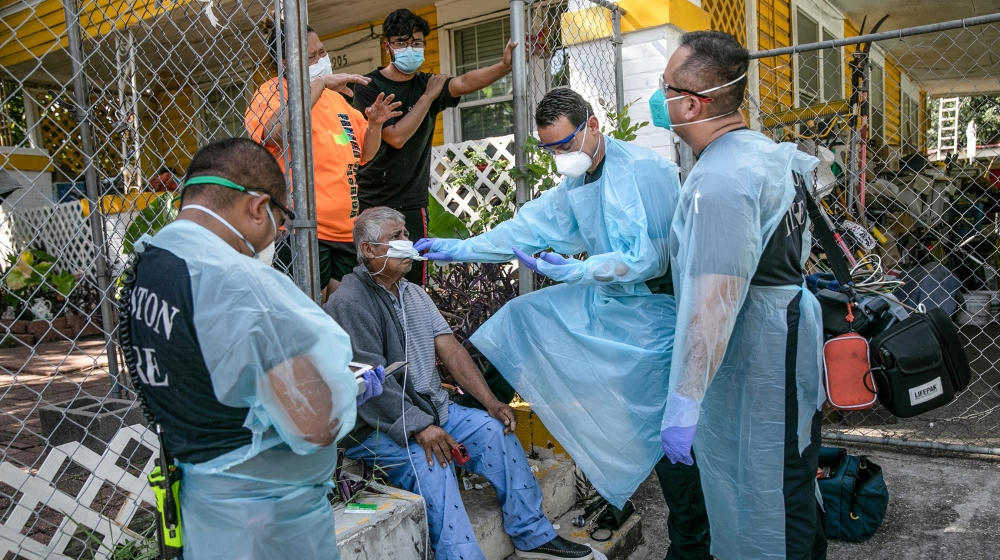
19:27 GMT – Phil Hogan resigns as EU trade chief after Ireland trip furore
Ireland’s Phil Hogan said he had resigned as European Union trade commissioner because of the controversy over alleged breaches of COVID-19 guidelines rules during a recent trip to his home country.
“It was becoming increasingly clear that the controversy concerning my recent visit to Ireland was becoming a distraction from my work as an EU Commissioner and would undermine my work in the key months ahead,” Hogan said in a statement.
18:56 GMT – France reports 5,429 new coronavirus infections, new post-lockdown high
The French health ministry said it had registered 5,429 new coronavirus infections over the past 24 hours, a new post-lockdown high and a level of new infections not seen since the height of the epidemic in early April.
The total number of people infected with the virus in France now stands at 253,587.
The health ministry said figures for the cumulative death toll and for COVID-19 hospitalisations for Wednesday were not available yet due to a technical glitch.
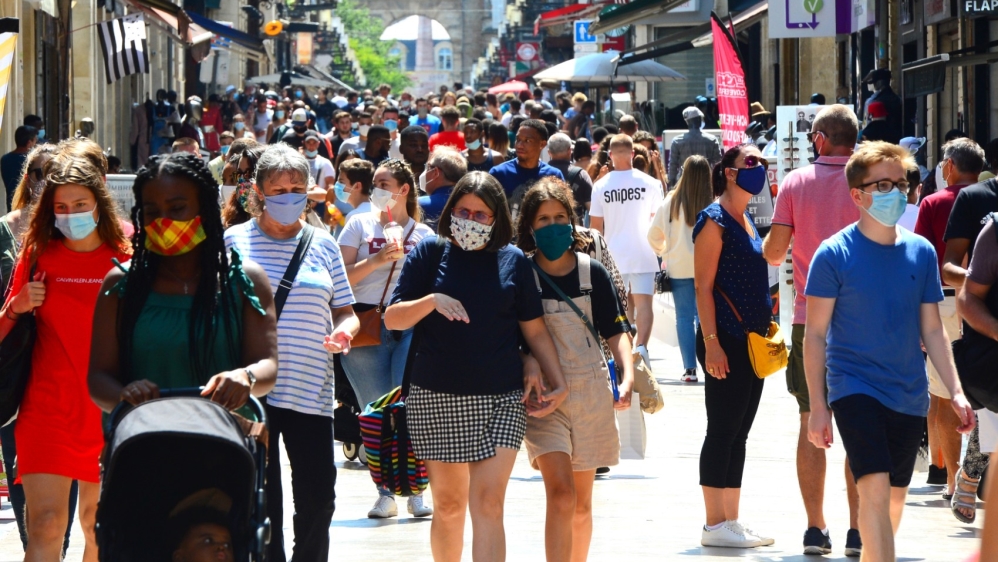
18:27 GMT – Qatar to reopen mosques for daily and Friday prayers from September 1
Qatar has decided to reopen all mosques across the country for daily and Friday prayers from September 1, a statement by the supreme committee for crisis management announced.
The statement said this would be part of the fourth and final phase of a plan that started on June 15, aimed at gradually lifting coronavirus restrictions.
17:59 GMT – Women may mount stronger COVID-19 immune response
A new study looking at male and female immune responses to the new coronavirus may shed new light on why men are more likely to become seriously ill with COVID-19, researchers said.
Since early in the pandemic it has been clear that men, particularly older men, are at a far higher risk of dying from the virus than women of a similar age, but scientists have not yet been able to pinpoint exactly why.
A new study published in the journal Nature noted that globally, men account for about 60 percent of deaths from COVID-19 and looked at whether differences in immune responses could explain why.
“What we found was that men and women indeed develop different types of immune responses to COVID-19,” said the study’s lead author Akiko Iwasaki, a professor at Yale University, in a video.
The immunity specialist said “these differences may underlie heightened disease susceptibility in men”.
|
|
17:33 GMT – Norway adds Germany to COVID-19 quarantine list
Norway said it will impose a 10-day quarantine on all people arriving from Germany and Liechtenstein from August 29 due to rising numbers of COVID-19 cases in those countries.
Similar restrictions will also be imposed on those coming from two additional regions in Sweden, the Norwegian foreign ministry said in a statement.
16:57 GMT – Spain reports 3,594 new cases as struggle to halt virus spread continues
Spain reported 3,594 new coronavirus infections as it struggled to contain a second wave of contagion that hit a peak of some 8,000 cases last Friday.
The country has registered the largest number of cases in western Europe since the pandemic began six months ago and the biggest resurgence after lifting one of the continent’s strictest lockdowns against the spread of COVID-19.
The latest daily increase was below the roughly 4,000 cases recorded a day earlier, according to updated health ministry data, and brought the cumulative total to 419,849.

16:20 GMT – Romanian theatres, restaurants could reopen in September
Romanian theatres and cinemas could reopen from September 1 with social distancing restrictions and protective masks, while the return of indoor restaurants depends on the number of new coronavirus cases in each region, the president said.
Romania has been reporting just over 1,000 new cases per day since late July, bringing confirmed cases to 81,646 since the pandemic reached the country in late February.
15:55 GMT – Jordan to reimpose lockdown in Amman
Jordan’s government is to impose a 24-hour lockdown on the capital Amman and the city of al-Zarqa on Friday in a return of the strict measures it credits with containing the virus earlier this year.
The “comprehensive lockdown” aims at slowing down the spread of the virus and allowing medical teams to test as many suspected cases as possible, government spokesman Amjad al-Adaileh said.
All businesses will be closed and no one will be allowed to leave their houses for 24 hours, except for a few essential workers.
15:20 GMT – Insect spray chemical can kill coronavirus: UK study
A chemical used in insect repellent can kill the strain of coronavirus that causes COVID-19, according to a preliminary study by Britain’s defence laboratory.
Scientists at the Defence Science and Technology Laboratory (DSTL) found that Citriodiol, the active ingredient in repellents such as Mosi-guard, had anti-viral properties if mixed with the virus in the liquid phase and on a test surface.
“Mixing a virus suspension with Mosi-guard spray or selected constituent components resulted in a reduction in SARS-CoV-2,” said the study.
14:45 GMT – Ukraine temporarily bars most foreigners amid pandemic after Israel pilgrimage plea
Ukraine imposed a temporary ban on most foreigners from entering the country until September 28 and extended lockdown measures until the end of October to contain a recent spike in coronavirus cases.
Speaking at a televised cabinet meeting, Prime Minister Denys Shmygal also said the government would need to take a decision on Thursday on whether to ban major public events in September.
“The rise in coronavirus infections we have seen in recent weeks is forcing us to act more decisively,” Shmygal said.
Shmygal said the decisions were partly in response to a plea from Israel to prevent an influx of Hasidic Jews travelling to the central Ukrainian town of Uman for an annual pilgrimage, fearing it may become a virus hotspot.
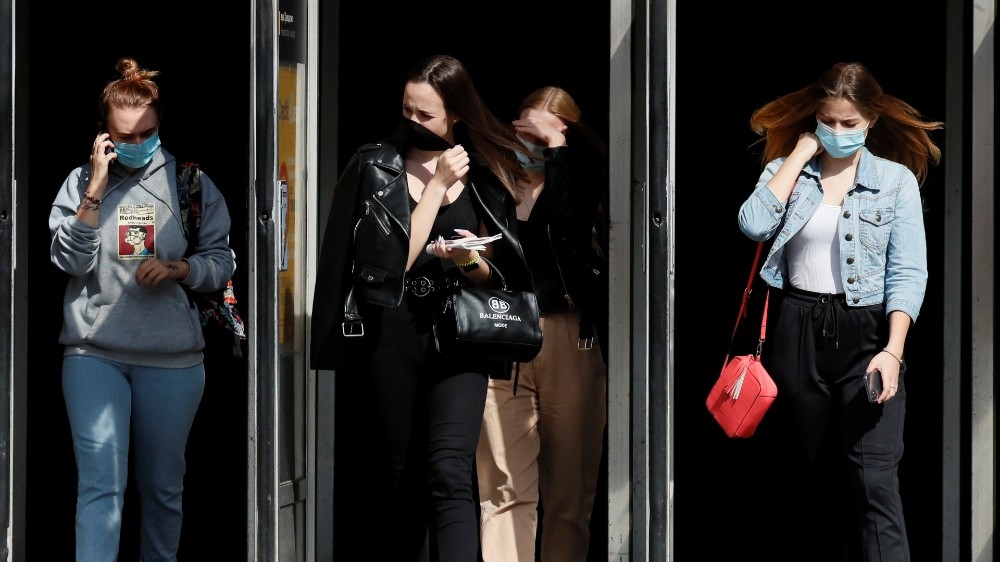
14:15 GMT – Davos meeting delayed to summer 2021 on COVID-19 fears – WEF
The 2021 Davos World Economic Forum (WEF) summit of business leaders and politicians has been called off for January due to the coronavirus pandemic, with organisers planning to reschedule the event to sometime early next summer.
“The advice from experts is that we cannot (host the event) safely in January,” WEF said in a statement.
13:30 GMT – UK’s Gatwick Airport to cut up to 600 jobs amid travel slump
Major British airport Gatwick said it needed to axe up to 600 jobs, or 24 percent of its workforce, because of the travel slump caused by the COVID-19 pandemic.
Gatwick, which is owned by VINCI Airports and Global Infrastructure Partners, said in a statement on Wednesday that it was only operating about 20 percent of last year’s flights and would now start formal consultations on job cuts.
This is Usaid Siddiqui in Doha taking over from my colleague, Saba Aziz.
11:15 GMT – Germany looks to scrap free tests for all travellers
Germany wants to scrap mandatory free coronavirus tests for returning travellers it introduced earlier this month to stop a rise in new cases, its health minister said, citing capacity constraints at laboratories.
The free tests were introduced in the first week of August after new coronavirus cases breached the 1,000-a-day threshold for the first time since May, heightening fears of a return to painful lockdowns.
A rule requiring travellers returning from areas that Germany considers as hotspots to self-quarantine for 14 days will remain. Compulsory tests for those travellers will stay in place.

11:00 GMT – Lebanon could ‘lose control’ of outbreak
Lebanon’s caretaker Prime Minister Hassan Diab said the country was at risk of losing its control over the country’s coronavirus outbreak after a spike in the number of cases following the massive explosion in the capital, Beirut, on August 4.
“The number of cases is increasing greatly, and if this continues, we will lose control of this epidemic,” Diab was cited as saying in a statement issued by the Supreme Defence Council.
Lebanon registered 525 new COVID-19 infections and 12 deaths on Tuesday. The country experienced a spike in infections following the catastrophic explosion in the capital city at the start of the month.
10:15 GMT – Iran’s coronavirus death toll exceeds 21,000
Iran’s death toll from the novel coronavirus rose by 119 to 21,020, the health ministry’s spokeswoman told state television, with the total number of identified cases rising to 365,606.
Sima Sadat Lari said 2,243 new cases were identified in the past 24 hours in Iran, rising from 2,213 a day earlier.
“Unfortunately, we have been facing a surge in coronavirus infections in recent weeks. I urge everyone to avoid unnecessary trips,” Lari said.
|
|
10:00 GMT – Thailand delays human testing for coronavirus vaccine
Thailand will delay human trials of its coronavirus vaccine due to limited production capacity at overseas facilities, a senior official said, but it hopes to resume trials by the end of the year.
Thai health authorities had planned human testing of the vaccine by October, but must delay that by several months as factories abroad are at full capacity, said Kiat Ruxrungtham, director of the Chulalongkorn University vaccine development programme.
09:45 GMT – How Qatar tackled COVID-19
Qatar has witnessed the world’s highest per capita coronavirus infection rate but one of the lowest death rates due to extensive testing, a young population and significant healthcare spending.
With 40,702 cases per million since the pandemic began, Qatar is followed by Bahrain, which has seen nearly 29,000 cases per million, and San Marino at more than 21,000.
Read more here.
![Emergency medical workers wearing protection equipment attend to a patient at a construction site in Doha, Qatar, April 05, 2020 [Sorin Furcoi/Al Jazeera]](/wp-content/uploads/2020/05/c2167fc24d7544298da2f9a39888a77f_18.jpeg)
09:30 GMT – Gaza reports first community coronavirus death
A 61-year-old Palestinian man has died in the Gaza Strip after contracting the coronavirus, authorities said as they clamped down on an outbreak of the pandemic in the besieged enclave.
The man had suffered previous illnesses and had been on a respirator, the health ministry said.
Meanwhile, nine new local cases were detected on Wednesday, raising the total to 15.
A full lockdown has been imposed in the entire Palestinian territory after authorities confirmed the first coronavirus cases spread through the community.
|
|
08:15 GMT – Myanmar expands Rakhine state lockdown
Myanmar has expanded a lockdown in conflict-racked Rakhine state to cover four more townships, halting the movement of about one million people as the number of coronavirus cases climbs steadily.
One hundred new infections – the biggest single-day jump – were confirmed across Myanmar in the last 24 hours – bringing the total to 574, with Rakhine state registering the bulk.
State capital Sittwe has been under lockdown and an overnight curfew since the weekend, and on Wednesday the order was extended to four townships elsewhere – Kyaukphyu, An, Taungup and Thandwe.
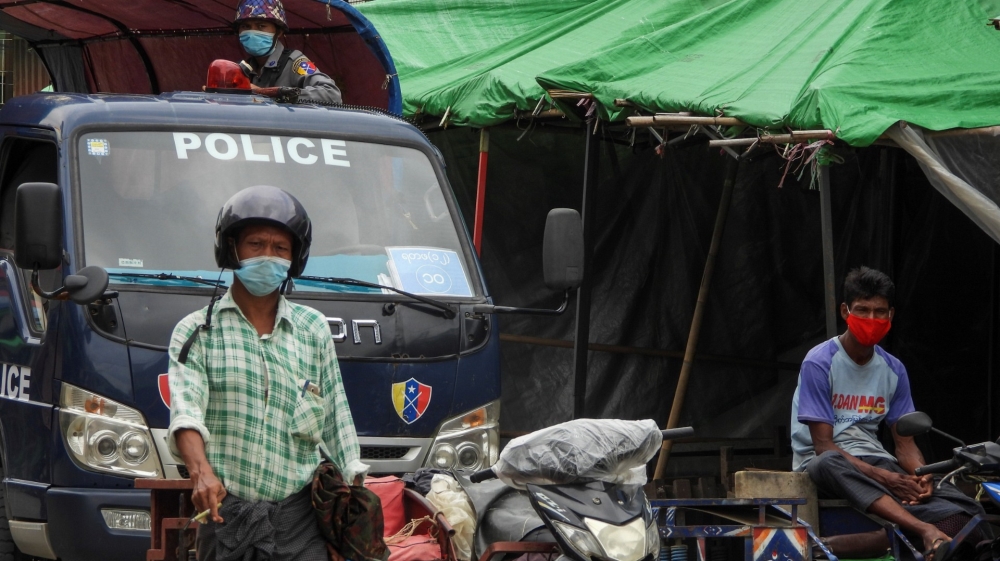
07:30 GMT – Latest coronavirus figures
Russia: 970,865 cases (4,676), 16,683 deaths (115)
Germany: 236,429 cases (1,576), 9,280 deaths (3)
Philippines: 202,361 cases (5,277), 3,137 deaths (99)
Indonesia: 160,165 cases (2,306), 6,944 deaths (86)
07:15 GMT – England schools in hotspots to make masks mandatory
It will be mandatory for pupils to wear face masks in communal areas of secondary schools in England in places with local lockdowns, Gavin Williamson, UK’s education minister, said after a government U-turn on enforcing their use.
Ministers had ruled out the need for pupils to wear masks in corridors despite updated advice from the World Health Organization, but the government has now said face coverings should be worn in schools in places facing restrictions to curb the spread of COVID-19.
Headteachers in other areas will also have the discretion to recommend using masks in their schools for students aged between 11 and 18.

06:45 GMT – France’s second wave could come in November: Gov’t adviser
A second wave of the coronavirus pandemic could hit France in November, a government adviser told local media, as the city of Marseille tightened restrictions to fight the outbreak.
Authorities in Marseille said late on Tuesday that bars and restaurants would have shorter opening times, and they also broadened mandatory mask-wearing in the southern port city between August 26 and September 30.
“There are fears of a second wave in November,” Professor Jean-Francois Delfraissy, who heads the scientific council that advises the government on the pandemic, told France 2 television on Wednesday.
06:30 GMT – Kazakhstan secures supplies of Russia’s vaccine
Kazakhstan has signed a deal to get supplies of Russia’s first potential COVID-19 vaccine once clinical trials are complete, the Central Asian nation’s government said.
The government did not say how many doses of the vaccine it planned to buy and at what price. It said the vaccine would be made available to at-risk Kazakh citizens free of charge.
The vaccine, called “Sputnik V” in homage to the world’s first satellite launched by the Soviet Union, has been hailed as safe and effective by Russian authorities and scientists following two months of small-scale human trials. But Western experts have been more sceptical.
Read more about it here.
|
|
Hello, this is Saba Aziz in Doha, taking over from my colleague Kate Mayberry in Kuala Lumpur
05:10 GMT – Myanmar reports biggest daily rise in cases
Myanmar has reported 100 new cases of the novel coronavirus, its biggest daily jump since the start of the pandemic.
The health ministry did not say where the new cases were found.
Most recent cases have been in Sittwe, the capital of Rakhine, the western state where there has been fighting between the military and rebels and where the Rohingya were driven from their homes in a brutal army crackdown three years ago.
Lockdown and curfew have been imposed in the city.
The Myanmar Red Cross has been working in the area since March to help people deal with a potential outbreak.
As more cases of #COVID19 emerge in #Rakhine state, @MyanmarRedCross is using cash transfers to strengthen communities’ capacity to deal with the virus through various community-led initiatives including making masks and soap. pic.twitter.com/99wvNxyoXh
— IFRC Asia Pacific (@IFRCAsiaPacific) August 26, 2020
04:40 GMT – S Korean doctors defy government order
It seems tens of thousands of doctors have gone ahead with a full-scale nationwide strike, defying the government’s return-to-work order.
They are angry about planned reforms to medical training, but the strike comes as the country grapples with a resurgence of coronavirus cases.
The three-day strike is organised by the Korean Medical Association (KMA), which has some 130,000 members, including interns and resident doctors at general hospitals and practitioners at neighbourhood clinics.
You can read more on the story here.
04:20 GMT – Australian antibody therapy aims for early 2021 trial
Researchers in Australia working on a coronavirus antibody therapy say they hope to start human trials in early 2021.
Wai-Hong Tam, a researcher at the Walter and Eliza Hall Institute in Melbourne, told the Reuters news agency the team has made good progress in identifying the most potent antibodies to neutralise the spike protein in the virus and stop it from getting into human cells.
Tam says antibody therapies would be most useful for older people and those with weakened immune systems.
03:50 GMT – Australia boosts defence spending in latest stimulus
Australia will boost defence spending by one billion Australian dollars ($716.80m) in the government’s latest attempt to help the country’s coronavirus-hit economy.
Prime Minister Scott Morrison says the money will be used to upgrade military facilities and offer additional paid employment to some 27,000 reservists.
Many of the facilities earmarked for improvement are in areas ravaged by fire earlier this year.
Australia could slip into recession for the first time in 30 years because of the pandemic.
02:20 GMT – South Korea’s striking doctors ordered back to work
Doctors in South Korea have been ordered back to work after they began a three-day strike on Wednesday, and the number of new coronavirus cases jumped above 300.
Trainee doctors and other medics have been staging walkouts in recent weeks, but a full-scale strike by members of the profession forced the country’s five major general hospitals to limit hours and postpone scheduled surgeries.
Tens of thousands of doctors will go on a full-scale strike this week in protest of the government's medical workforce reform plan and proceed with a rally in a non-contact manner amid spiking virus cases, @YonhapNews reports https://t.co/a837IQSFdb
— CSIS Korea Chair (@CSISKoreaChair) August 25, 2020
“The government has no choice but to take necessary legal actions such as an order to open business to not put citizens’ lives and safety in danger,” Health Minister Park Neung-hoo told journalists. “We urge all trainee and fellow doctors to immediately return to work.”
Doctors’ associations are opposed to government reforms that would include training more medical students, opening more public medical schools, and broadening telemedicine options. They say the money would be spent on improving the pay and conditions of existing trainees so they would be willing to work outside Seoul.
The country reported 320 new cases on Wednesday, with nearly 20 percent of cases in the past two weeks coming from unknown sources, according to Yonhap.
01:30 GMT – Malaysian minister to be questioned over failure to follow mandatory quarantine
Malaysia’s Plantation Industries and Commodities Minister Mohd Khairuddin Aman Razali is expected to be questioned by police on Wednesday after he failed to comply with a mandatory two-week quarantine when returning from a business trip to Turkey.
Mohd Khairuddin has been fined 1,000 ringgit ($240) for failing to go into quarantine after he returned from the trip on July 7.
Malaysians have been infuriated not only by his failure to comply with the quarantine rules, but also that he was allowed to travel overseas at a time when Malaysians are barred from leaving the country.
A man who returned from India in July and failed to comply with his quarantine was jailed for five months and fined 12,000 ringgit ($2,880), while a 72-year-old woman who had lunch out in breach of quarantine orders was jailed for a day and fined 8,000 ringgit ($1,920).
Regarding his failure to comply with mandatory home quarantine after returning from Turkey in July.#AWANInews #AWANIpagi #EnglishNEWS #COVID19 https://t.co/nupqOx9lo6
— 🇲🇾Astro AWANI🇲🇾 (@501Awani) August 26, 2020
Tan Sri @DGHisham, the issue is discriminative enforcement in favour of the political elite. Raising the quantum is meaningless if law-breaking Ministers are still given convenient exit when offenders from among the common people get the full brunt of the law. https://t.co/3t2QmfqU3r
— Daud Suratman (@DaudSuratman) August 25, 2020
One is unlike the others. pic.twitter.com/nTdxSUUJCP
— Lee Seng Foo🇲🇾李成富 (@sengfoo88) August 22, 2020
00:30 GMT – Latest data from Mexico, China
Mexico and China have just released their latest data on coronavirus.
Mexico has confirmed 4,916 new cases of the disease and 650 more deaths, bringing its totals to 568,621 cases and 61,450 deaths.
China, meanwhile, has reported 15 new cases in the mainland – all of them in people returned from overseas. The mainland has not confirmed a domestically transmitted case in 10 days. It also had 14 new asymptomatic cases, which are not included in confirmed cases. The death toll remains unchanged at 4,634.
23:30 GMT (Tuesday) – North Korea’s Kim calls for enhanced prevention efforts
Kim Jong Un has told North Korea to step up prevention efforts against the coronavirus.
State news agency KCNA says a politburo meeting “assessed some defects in the state emergency anti-epidemic work for checking the inroads of the malignant virus”.
North Korea has not reported any confirmed cases of the virus, but imposed a strict lockdown in the city of Kaesong after a man there showed symptoms of the disease. Later tests were inconclusive, according to the WHO.
23:05 GMT (Tuesday) – Cambridge to start vaccine trials in the autumn
The University of Cambridge said it will start clinical trials of a possible coronavirus vaccine in the UK’s autumn (the months of September to December) after getting funding of 1.9 million pounds ($2.5m) from the UK government.
The scientists working on the vaccine – called DIOS-CoVax2 – are using genetic sequences of all known coronaviruses to hone an immune response and reduce potential side effects.
“We’re looking for chinks in its armour, crucial pieces of the virus that we can use to construct the vaccine to direct the immune response in the right direction,” said Jonathan Heeney, head of the Laboratory of Viral Zoonotics at the university.
There are already 30 vaccines in human trials.
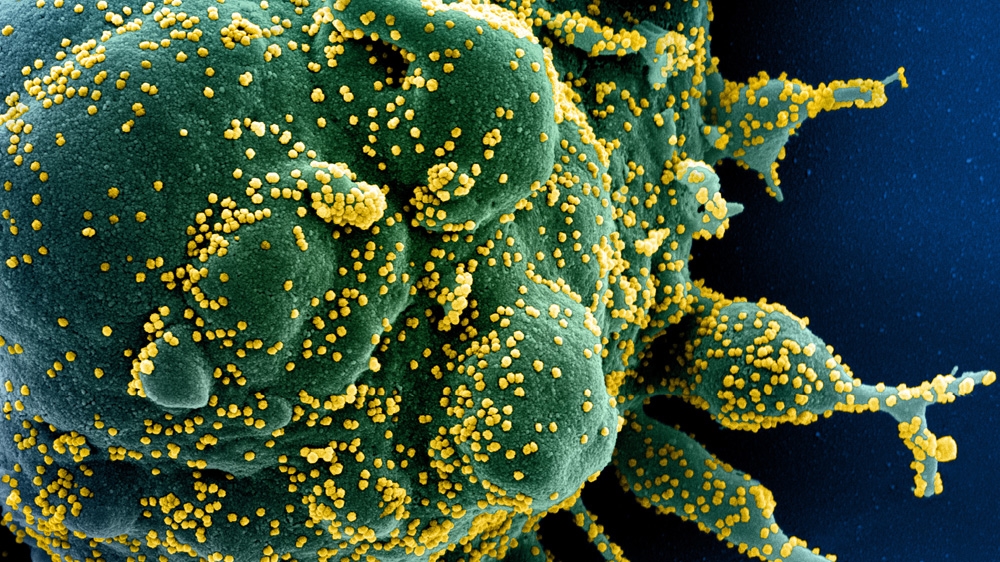
23:00 GMT (Tuesday) – Victoria reports 149 new cases, 24 deaths in past 24 hours
Australia’s southern state of Victoria has reported its second-deadliest day of the pandemic with 24 deaths and 149 new cases of coronavirus in the past 24 hours.
Melbourne, the state’s capital and the second-biggest city in Australia, is midway through a six-week lockdown and curfew as it battles a resurgence of the disease.
Almost 64 percent of deaths have been among elderly people living in nursing homes.
—-
Hello and welcome to Al Jazeera’s continuing coverage of the coronavirus pandemic. I’m Kate Mayberry in Kuala Lumpur.
Read all the updates from yesterday (August 25) here.
